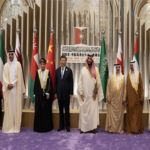Energy News Beat
ENB Pub Note: An interesting view on the Middle East drama unfolding. Andrew Korybko has a substack that I recommend reading and supporting. While I do not agree with all of his articles or summaries, his research and thought process is worth your time. Source HERE:
It’s unclear how everything will ultimately end, but the present trajectory certainly seems to be one whereby China is comprehensively expanding relations with American allies like those in the GCC as part of its ongoing New Détente with the US simultaneously with distancing itself from its traditional Russian, Indian, and Iranian partners that are collectively aspiring to create a third pole of influence for breaking through the bi-multipolar impasse in International Relations.
Unexpected Chinese-Iranian Drama
The Chinese Ambassador to Iran had a visit with his host country’s Foreign Ministry officials following the joint statement that China agreed to with the GCC during President Xi’s visit to Riyadh last week. Tehran reacted calmly but nevertheless firmly to Beijing signing off on this fiercely anti-Iranian text that slammed the Islamic Republic on multiple issues, including its putative support of terrorism as well as the UAE’s claims to several Gulf islands that presently remain under Iran’s control.
Indisputably Anti-Iranian Declarations
Describing the Chinese-GCC joint statement as fiercely anti-Iranian isn’t an exaggeration either as proven by the following excerpts from that scandalous document sourced from the Saudi Press Agency:
“11. The leaders stressed the importance of a comprehensive dialogue with the participation of the countries of the region to address the Iranian nuclear file and destabilising regional activities, address support for terrorist and sectarian groups and illegal armed organisations, prevent the proliferation of ballistic missiles and drones, ensure the safety of international navigation and oil installations, and adhere to UN resolutions and international legitimacy.
12. The leaders affirmed their support for all peaceful efforts, including the initiative and endeavours of the United Arab Emirates to reach a peaceful solution to the issue of the three islands; Greater Tunb, Lesser Tunb, and Abu Musa, through bilateral negotiations in accordance with the rules of international law, and to resolve this issue in accordance with international legitimacy.”
Paragraph 11 clearly condemns Iran’s regional policies (whether objectively existing, completely invented, or a blend thereof) while Paragraph 12 involved China in a dispute that Iran doesn’t recognize.
Petroyuan Plans
Regarding the first, it’s understandable why Tehran would be concerned that Beijing signed off on a joint statement containing that provocative text since it suggests that the People’s Republic extends credence to the claims coming from Iran’s regional rivals that it’s secretly building a nuclear weapon and exporting terrorism. As for the second, Iran regards the islands in question as being its historical territory and thus not subject to negotiation, similar in spirit to how China regards Taiwan and Russia regards Crimea.
Frankly speaking, it was surprising to see that China agreed to the joint statement without requesting that those provocative passages be watered down to remove any direct reference to Iran or be outright removed from the final version. It can’t be known for sure, but the People’s Republic might have thought that agreeing to them would advance its grand strategic goal of having the yuan replace the dollar in regional oil purchases (“petroyuan”).
China’s West Asian Balancing Act
To that end, it appears to have gambled that risking Iran’s offense by extending support to the GCC’s claims against Tehran is a manageable outcome in pursuit of the greater multipolar good. To explain, China and Iran signed a 25-year strategic partnership pact in spring 2021 that was reported to involve around $400 billion worth of promised investments over the next quarter-century, so Beijing might not have thought that Tehran would risk impeding that by protesting the latest joint statement too loudly.
As for the GCC dimension of China’s West Asian balancing act, the burgeoning goodwill and trust between them brought about by agreeing to that fiercely anti-Iranian joint statement was thought to take Beijing’s petroyuan plans a step further. About that ambitious goal, it remains unclear at exactly what pace the GCC would be willing to proceed, though there seems to be little doubt that it’s seriously entertaining that scenario since it aligns with its members’ objective long-term national interests.
The New Détente
Nevertheless, proceeding so quickly risks provoking the US’ Hybrid War wrath to uncertain ends, ergo the need to likely only make gradual progress in this respect unlike the rapid shift that Beijing might be expecting. In any case, the emerging trajectory is clearly in China’s zero-sum favor at the expense of the US’ global financial hegemony that’s largely predicated on the “petrodollar”. Even though the People’s Republic presumably prefers to proceed quickly, it might settle for the GCC’s likely gradual evolution.
That scenario wouldn’t just pragmatically show respect for its partners’ sensitive interests vis a vis the US, but could also be part of the ongoing discussions between the superpowers over a New Détente. These were analyzed at length in my latest analysis asking “Will The US Sell India Out To China To Sweeten The Deal For A Sino-American New Détente?”, which posits that the US might consider far-reaching economic concessions to China in exchange for it making security ones in turn.
In the context of the present piece, the gradual introduction of the petroyuan could be part of their larger deal over establishing a balance of influence between them that could then function as the “new normal” for upholding the bi-multipolar system in which they both have a self-interested stake preserving in the face of Indian-driven tripolarity-multiplexity processes this past year. One of the top such ones is India’s grand strategic convergence with Iran and Russia as a third pole of influence.
The Russian-Iranian Strategic Partnership
Despite Iran’s 25-year strategic partnership pact with China, it’s comprehensively expanded related relations with Russia over that aforesaid timeframe to the point of those two now being each other’s top military allies according to the American government’s latest official assessment. Game-changing energy deals are also in the cards between them too, including $40 billion of possible Russian investments and the speculative possibility of Iran joining a Russian-led Central Asian gas union.
Objectively speaking, Russia is a much closer and more meaningful strategic partner for Iran right now than China is, with the latter being unable to compete with Moscow in this respect due to their differing views over the pace of the global systemic transition. Russia was coerced by circumstances into unprecedentedly accelerating these complex processes through its special operation that inadvertently destabilized globalization, while China always preferred a gradual and predictable evolution instead.
Iran’s post-1979 government is proudly revolutionary and therefore also supports the newfound Russian approach to the global systemic transition. In such a situation where those two and India are converging into a third pole of influence that threatens to break the Sino-American bi-multipolar superpower duopoly, it therefore naturally follows that China’s relations with Iran could also figure into its ongoing discussions with the US over a New Détente exactly as India does per the earlier hyperlinked analysis.
Shattering Expectations
The grand energy plans that the People’s Republic might have previously had with its Islamic counterpart could be drastically curtailed by its partner agreeing to Russia’s competing ones instead, which adds some context to the recent 27-year LNG deal between China and Qatar. It deserves mention that not only is Qatar a member of the GCC, albeit one that enjoys mutually beneficial ties with Iran, but it was also designated as the US’ latest Major Non-NATO Ally (MNNA) earlier this spring.
It’s therefore curious on the surface then that China would make its energy security comparatively more dependent on an officially designated US military ally when it could instead prospectively ensure reliable long-term supplies from nearby Iran instead. The confusion is clarified upon incorporating the prior insight about the ongoing Sino-American discussions over a New Détente into those grand strategic calculations, however, after which the trappings of a larger deal between them becomes apparent.
Speculating On The Sino-American Quid Pro Quo
As was earlier explained, the theme of their discussions seems to be China making security concessions regarding its acceptance of NATO-like AUKUS+’s entrenchment in the Asia-Pacific in exchange for the US making far-reaching economic concessions as a quid pro quo. The latter seems to involve gradually introducing the petroyuan as well as promising not to disrupt China’s LNG imports from MNNA Qatar through the US’ maritime “sphere of influence” in partial exchange for not importing as much from Iran.
To be clear, China will almost certainly invest in related energy infrastructure in Iran throughout the coming quarter-century as part of their strategic partnership deal, which would be mutually beneficial and welcomed by both. That said, any prior predictions about the People’s Republic disproportionately relying on its Islamic counterpart for speculative ideological reasons related to their broadly (key qualifier) shared multipolar visions are discredited by the Qatar deal and its joint GCC statement.
Beijing Is Hedging Its Iranian Bets
The last two pieces of evidence prove that China is hedging its bets regarding Iran, perhaps as part of a quid pro quo connected to its ongoing New Détente discussions with the US that arguably concern India as was earlier explained and could thus also involve its strategic convergence with Iran and Russia. The last-mentioned might eventually invite Tehran to join its proposed Central Asian gas union, which could lead to them exerting premier influence over that energy market, including controlling prices to China.
Beijing might fear that they could leverage their newfound strategic role in support of their shared Indian partner to indirectly pressure China into politically resolving their decades-long border dispute instead of resorting to military means, which could be advanced to “save-face” amidst Asia-Pacific security concessions to the US. Whatever China’s strategic energy calculations are, there’s no doubt that it prefers to preemptively avert the scenario of disproportionate dependence on this possible gas union.
This insight accounts for its 27-year LNG deal with MNNA Qatar and its signing of the fiercely anti-Iranian joint statement with the GCC that’s intended to advance its ambitious goal of introducing the petroyuan, albeit gradually per its partners’ preference and possibly as part of its planned New Détente with the US. Absent any consideration of those ongoing Sino-American discussions, it doesn’t make sense why China would increase its energy dependence on a US military ally and agree to a provocative anti-Iranian text.
Concluding Thoughts
It’s unclear how everything will ultimately end, but the present trajectory certainly seems to be one whereby China is comprehensively expanding relations with American allies like those in the GCC as part of its ongoing New Détente with the US simultaneously with distancing itself from its traditional Russian, Indian, and Iranian partners that are collectively aspiring to create a third pole of influence. This trend is objectively existing and easily verifiable, and it should thus figure into all forthcoming analyses.
The post Why’d China Agree To Such A Fiercely Anti-Iranian Joint Statement With The GCC? appeared first on Energy News Beat.








